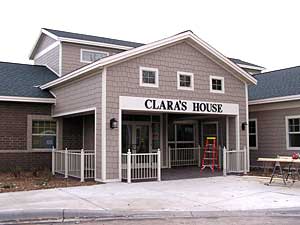|
Audio
Photos
Resources
Your Voice
|
Clara's House opens in St. Cloud
October 18, 2004
 |
| Clara's House in St. Cloud is a partial-hospitalization clinic for children and adolescents with mental illness. They spend days at the clinic and nights at home. (MPR Photo/Lorna Benson) |
St. Cloud, Minn. — St. Cloud is unusual. In an era when many hospitals are closing their mental health programs, St. Cloud's CentraCare Health System just spent $3 million on a clinic for kids with mental illness. It's a partial hospitalization clinic, where patients receive care during the day, but go home at night.
 | |||
It's a remarkable accomplishment, considering the fact that mental illness is a money loser for hospitals. Insurance payments rarely cover a hospital's actual costs.
To observers in the health industry, CentraCare's $3 million building might appear foolhardy. But in reality, the St. Cloud medical group didn't take a huge financial risk.
"If we weren't able to raise the money, we weren't going to build the building and the program would not exist," says Mark Larkin, Vice President for Development at CentraCare.
Larkin says there was no question that St. Cloud needed the building, but the clinic and hospital group couldn't justify the cost of constructing it. So the CentraCare Foundation did something it had never done before. It added a mental health fundraiser to its capital campaign.
 | |||
"We said, we really didn't test for this. We're not sure how people will react to it," says Larkin. "Mental illness is something people still don't talk freely about."
To CentraCare's surprise, donors like Mae Ellingson-Skalicky didn't need much convincing. She donated $1 million in exchange for naming rights. She's decided to call it Clara's House, in memory of her mother.
"I think it is a shame that a facility like this has to be built by donors," says Ellingson-Skalicky. "But to be honest, it has given me such joy. It really has."
In many ways, Clara's House is the vision of Dr. Read Sulik. When he came to St. Cloud a few years ago, the community didn't have a single child and adolescent psychiatrist. He immediately set to work recruiting others. Now, St. Cloud has four psychiatrists who treat kids. And it has Clara's house.
 | |||
"I don't know of that being done anywhere else to this level. Particularly, a community the size of St. Cloud," says Sulik.
He says none of this would have happened if CentraCare had resisted his pleas. "We have a health care system here that's been willing to allow us to push them to do this," says Sulik.
Sulik believes St. Cloud's success can be duplicated elsewhere. University of Minnesota psychiatrist George Realmuto says he may be right. But it takes some special circumstances.
"This system is underfunded, and when we talk about money the conversation stops," says Realmuto. "So when you get a million dollars from a benefactor the conversation doesn't stop, and things get built."
The chairman of Gov. Tim Pawlenty's health care cabinet, Cal Ludeman, has been following St. Cloud's progress. He's impressed with what the community has accomplished. But he's not sure yet what it might mean for other communities.
"I think it's leading the way so far ahead of the system here that I guess it'll take some time to prove," says Ludeman.
Ludeman says the state is taking a different approach to fixing the mental health crisis. He's trying to convince health plans to agree on some standards for paying for mental health care. Ludeman says it's a complicated task, but he thinks the state and insurers will agree on at least some payment solutions within the next year.
|
News Headlines
|
Related Subjects
|

